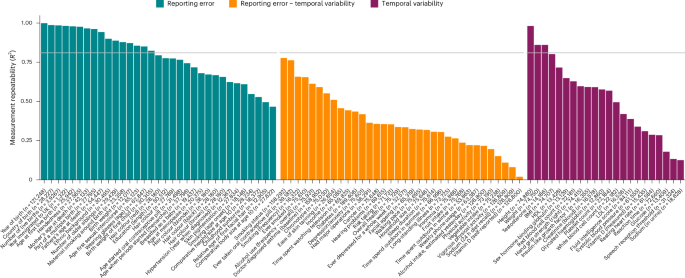英国生物库中自我报告不准确的影响及其与选择性参与的相互作用
IF 21.4
1区 心理学
Q1 MULTIDISCIPLINARY SCIENCES
引用次数: 0
摘要
尽管使用简短的自我报告措施是生物库倡议的常见做法,但这种表型策略本质上容易出现报告错误。为了探索与自我报告错误相关的挑战,我们首先在英国生物银行(UKBB;N = 73,127),在多个测量场合捕捉到时不变表型中不一致的自我报告。然后,我们对报告错误评分进行全基因组扫描,应用下游分析(连锁不平衡评分回归和孟德尔随机化),并将其属性与UKBB参与倾向进行比较。最后,我们提高了24种方法的表型分辨率,并检查了基因组研究结果的变化。我们发现,在所有33项评估的自我报告测量中,报告错误都存在,可重复性低至47%(儿童体型)。报告错误并非独立于UKBB的参与,两个结果之间的负遗传相关性(rg = - 0.77)、它们的共同原因(例如,教育)和参与偏倚校正后自我报告准确性的损失证明了这一点。在所有分析中,报告错误的影响范围从功率降低(例如,基因发现)到有偏差的估计(例如,暴露变量中存在的估计)和全基因组数量的衰减(例如,儿童身高的SNP遗传率相对衰减21%)。我们的研究结果强调,在生物库规模的研究中,自我报告的准确性和选择性参与都是相互竞争的偏见和可重复性差的来源。本文章由计算机程序翻译,如有差异,请以英文原文为准。


The impact of self-report inaccuracy in the UK Biobank and its interplay with selective participation
Although the use of short self-report measures is common practice in biobank initiatives, such a phenotyping strategy is inherently prone to reporting errors. To explore challenges related to self-report errors, we first derived a reporting error score in the UK Biobank (UKBB; n = 73,127), capturing inconsistent self-reporting in time-invariant phenotypes across multiple measurement occasions. We then performed genome-wide scans on the reporting error score, applied downstream analyses (linkage disequilibrium score regression and Mendelian randomization) and compared its properties to the UKBB participation propensity. Finally, we improved phenotype resolution for 24 measures and inspected the changes in genomic findings. We found that reporting error was present across all 33 assessed self-report measures, with repeatability levels as low as 47% (childhood body size). Reporting error was not independent from UKBB participation, evidenced by the negative genetic correlation between the two outcomes (rg = −0.77), their shared causes (for example, education) and the loss in self-report accuracy following participation bias correction. Across all analyses, the impact of reporting error ranged from reduced power (for example, for gene discovery) to biased estimates (for example, if present in the exposure variable) and attenuation of genome-wide quantities (for example, 21% relative attenuation in SNP heritability for childhood height). Our findings highlight that both self-report accuracy and selective participation are competing biases and sources of poor reproducibility for biobank-scale research. Biobank data are extensively used. Schoeler and colleagues show that self-report inaccuracy and selective participation are sources of poor reproducibility for biobank-scale research.
求助全文
通过发布文献求助,成功后即可免费获取论文全文。
去求助
来源期刊

Nature Human Behaviour
Psychology-Social Psychology
CiteScore
36.80
自引率
1.00%
发文量
227
期刊介绍:
Nature Human Behaviour is a journal that focuses on publishing research of outstanding significance into any aspect of human behavior.The research can cover various areas such as psychological, biological, and social bases of human behavior.It also includes the study of origins, development, and disorders related to human behavior.The primary aim of the journal is to increase the visibility of research in the field and enhance its societal reach and impact.
 求助内容:
求助内容: 应助结果提醒方式:
应助结果提醒方式:


